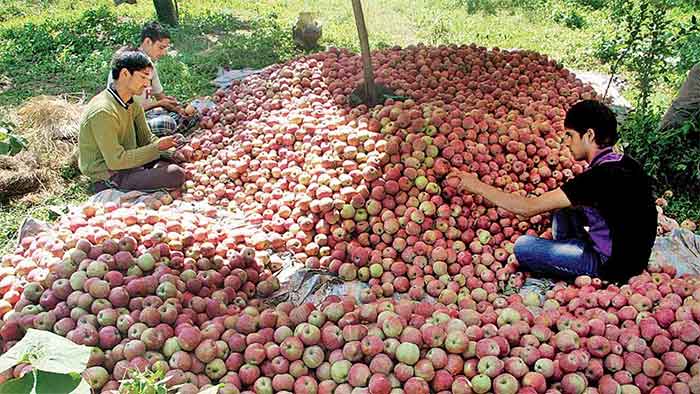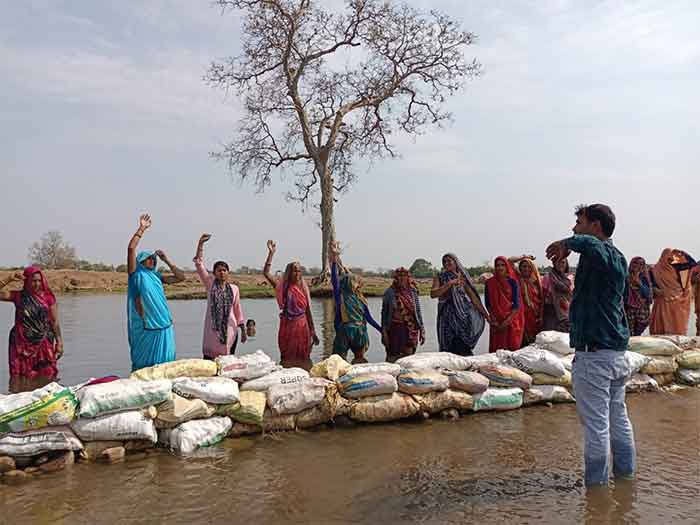New capacity created by World Bank funded unit in Himachal Pradesh for obtaining 100,000 litres of wine from apples per year is bad news for nutrition, health and ecology

One of the biggest distortions of the food system is that several highly nutritious foods, particularly fruits, are being increasingly diverted for the production of various alcoholic drinks at a time when these are needed so much to eliminate or reduce malnutrition.
Unfortunately the state of Himachal Pradesh has been increasingly taking wrong steps in the direction of converting more and more of its nutritious fruits into wine.
Here it may be mentioned that the alcohol content of wine is significantly higher than that of beer, in some cases several times higher, and the ecological and carbon footprint of the entire wine cycle is known to be very high. In the hills of Himachal Pradesh, road accidents are known to be high and one reason is the easy availability of alcoholic drinks very close to highways. As apple wine is sometimes sold in the same roadside shops where apple juice is sold, it is very easily accessible even to non-adult population. In fact its easy access in places where health drinks are sold serves the purpose of the alcohol lobby very well.
As reported in The Tribune dated 27 December, 2023(see report titled ‘Sukhu inaugurates Rs. 100 crore fruit processing plant at Parala’), under the World Bank-funded Himachal Pradesh Horticulture Development Project, a fruit processing plant has been started at Parala in Shimla district at a cost of Rs. 100 crore which apart from units of producing apple juice, jam etc. (which are welcome) will in addition have a unit of producing 1 lakh litre wine per annum. This news also quotes a senior official as stating that in addition apple alcoholic cider should be produced here, so it is likely that the production of alcoholic drinks using apples ( or may be some other fruits as well) will increase to a level more than this. This, according to officials, is being seen as progress.
However there is a need to question whether the conversion of a healthy fruit into an alcoholic drink with all its adverse health and social impacts can be regarded as progress.
If there is excess apple availability in the area, why not make apples with their high nutrition available for anganwadis and mid-day meals? This will genuinely help to reduce malnutrition among vulnerable children, pregnant women and mothers. In addition there is a strong case for making jams and related produce in cottage scale units generating more employment for rural women instead of setting up highly mechanized plants.
There have been several social movements against alcohol led by women in Himachal Pradesh who regard alcohol as one of the most important causes of health and social harm.
In a year worldwide about 3 million deaths are caused by alcohol. Almost half of cases of violence against women involve some alcohol consumption. Alcohol consumption is one of the leading causes of accidents.
By concentrating a lot of fruit bulk into a small amount of intoxicating drink, land and water resources are being used wastefully in a country and region which need to prioritize food and nutrition for people.
Such wasteful use of apple will either diminish apple availability to weaker section consumers, who earlier got lower quality fruit very cheaply or even free, and/or this will push more area under apples, thereby leaving less land for staple food crops (including hardy traditional crops such as several millets) that have been diminishing. Cultivation of apples involves higher use of various agro-chemicals compared to hardy traditional cropping patterns. This is not to argue against apple cultivation but only to caution that its expansion beyond a limit can be counter-productive, while increasingly converting apple bulk into wine and cider will encourage such a trend of over-expansion.
Hence both World Bank and the HP government should reconsider the wine unit of the Parala plant. The juice and jam units can continue but the wine/cider unit should be discontinued.
Moreover the wider trend in this direction should also be checked. Earlier a newspaper Dainik Jagran had reported that the state has contracted with a Delhi company to promote wine produced from plums and apples as well as rhododendron flowers grown here. Another newspaper Navbharat Times reported in 2018 that plans are on to convert a mix of fruit and the famous Kangra tea of Himachal Pradesh into wine with 12% alcohol content. This news report, which was titled ‘chai mein jab gholi jai thori si sharab’ quoted officials who made very false claims regarding he benefits of this wine.
Just imagine—even the daily cup of tea coming mixed with alcohol. All these are steps in the direction of increasing the social acceptance of alcoholic drinks and increasing their consumption in a big way under the influence of the powerful alcohol lobby. Already India is counted among those countries where increase of alcohol consumption is causing an enormous health and social burden, and now the alcohol lobby is bent on further accentuating this problem. The overall ecological costs of increasing alcohol (including wine) production are also known to very high. Hence health, nutrition, social and environmental activists should resist such trends.
Bharat Dogra is Honorary Convener, Campaign to Save Earth Now. His recent books include Planet in Peril, Protecting Earth for Children, A Day in 2071 and India’s Quest for Sustainable Farming and Healthy Food.














































